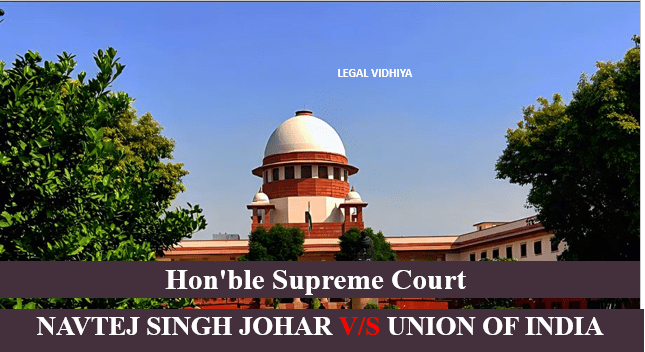
| CITATION | AIR 2018 SC 4321; W.P. (Crl.) No. 76 of 2018 D. No. 14961/2016 |
| DATE OF JUDGMENT | 6 September 2018 |
| COURT | Supreme Court of India |
| APPELLENT | Navtej singh JoharRitu DalmiaAyesha KapurAman NathSunil Mehra |
| RESPONDENT | Ministry of Health , represented by Tushar Mehta |
| BENCH | CJI Dipak Misra, Justice A.M. Khanwilkar, Justice Rohinton Fali Nariman, Justice D. Y. Chandrachud and Justice Indu Malhotra |
INTRODUCTION
The Navtej Singh Johar v. Union of India (2018) case stands as a pivotal judgment delivered by the Supreme Court of India. This case revolved around the constitutionality of Section 377( Unnatural offences.—Whoever voluntarily has carnal intercourse against the order of nature with any man, woman or animal, shall be punished with 1[imprisonment for life], or with imprisonment of either description for a term which may extend to ten years, and shall also be liable to fine. ) of the Indian Penal Code (IPC), which criminalized consensual homosexual acts between adults.Navtej Singh Johar, alongside several other petitioners, approached the Supreme Court to seek the decriminalization of adult consensual same-sex relationships. They contended that Section 377 of the IPC infringed upon various fundamental rights enshrined in the Indian Constitution, including the right to equality, right to privacy, and right to personal liberty.
FACTS OF THE CASE
The central issue in this case concerned the constitutional validity of Section 377 of the IPC, which dealt with “unnatural offenses” and penalized “carnal intercourse against the order of nature” in the context of consensual same-sex relationships. In 2009, the High Court of Delhi had declared Section 377 unconstitutional in the Naz Foundation case, but this decision was later overturned by the Supreme Court in the Suresh Kumar Koushal case. In 2016, the petitioner, Navtej Singh Johar, filed a writ petition challenging the constitutionality of Section 377 and the Supreme Court’s decision in Suresh Kumar Koushal. Given the significance of the issue, it was referred to a five-Judge Bench.
ISSUE
The main questions before the Court were:
- Whether Section 377 of the IPC violated Article 14 and 15 of the Indian Constitution.
- Whether Section 377 of the IPC violated Article 21 of the Indian Constitution.
- Whether Section 377 of the IPC was unconstitutional.
ARGUMENTS
Petitioner’s Arguments:
The petitioners argued that sexual orientations like homosexuality and bisexuality are natural and not indicative of any form of illness. Criminalizing them undermines an individual’s dignity, causes distress regarding gender identity, and intrudes upon the right to privacy guaranteed by Article 21 of the Constitution. It also impacts personal growth, relationship building, and the pursuit of essential desires, all protected under Article 19(1)(a) of the Constitution.
The LGBTQ+ community constitutes a significant portion of the Indian population, approximately 7-8%, and they face discrimination and abuse based on their sexual orientation. Therefore, they need greater protection than majority communities to realize their full potential and live without fear or apprehension.
The petitioners also contended that although transgender individuals have received recognition as a third gender and certain rights under the NALSA case, their consensual activities are still treated as offenses.
Respondent’s Arguments:
The respondent on behalf of Intervener said that sec 377 constitutes abusing the organs and such acts are undignified and derogatory and amount to constitutional wrong and constitutional immorality. They stated that sufficient rights had already been granted to the LGBTQ+ community in the NALSA case, and the additional reliefs sought by the petitioners would infringe upon privacy and personal liberty, exceeding the bounds of public morality.
Criminalization of acts in Section 377 was justified, as homosexuals engaging in such acts were more susceptible to contracting HIV compared to heterosexuals, and therefore, the right to privacy should not be extended in this context.
JUDGEMENT
The SC struck down the 158 years old law on homosexuality that made carnal intercourse against order of nature a criminal offence.
The court overruled its previous judgement given in Suresh Kaushal case and declared Sec 377 as unconstitutional as it violated Art 14,15,19 and 21 of the Constitution.
ANALYSIS
This judgment was a watershed moment, rectifying a historical injustice inflicted on the LGBTQ+ community by a Victorian-era law. The decision affirms that the LGBTQ+ community deserves equal rights and respect, just like any other individual. Discrimination based on sexual orientation is a profound affront to an individual’s dignity and self-worth.
CONCLUSION
In its verdict, the Supreme Court affirmed that consensual sexual acts between adults of the same sex would no longer be deemed criminal offenses. The court recognized the rights of LGBTQ+ individuals to equality, dignity, and privacy, asserting that discrimination based on sexual orientation is unconstitutional.
The judgment was a significant milestone not only in decriminalizing homosexuality but also in upholding the fundamental rights of LGBTQ+ individuals in India. It was celebrated as a triumph for human rights and inclusivity.
REFERENCES
https://blog.ipleaders.in/ (1July 2019)
https://legalserviceindia.com/
Written by Mita Sarker an intern under legal vdihiya




0 Comments